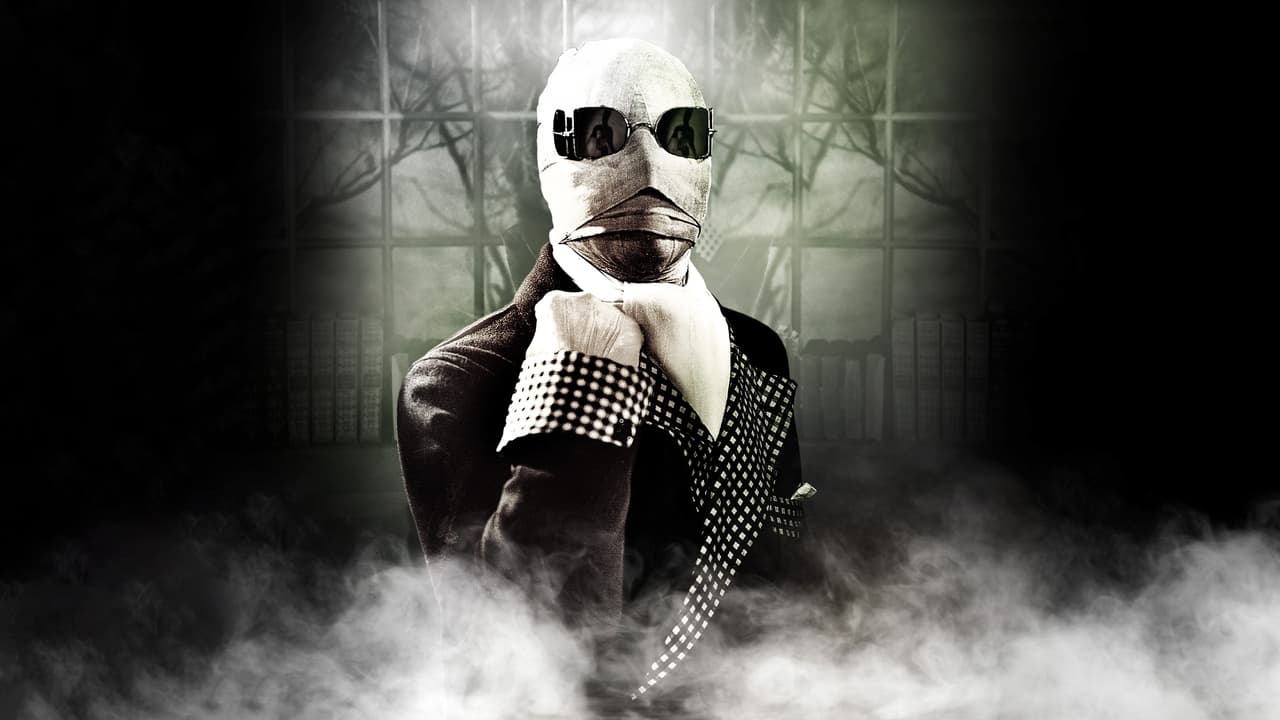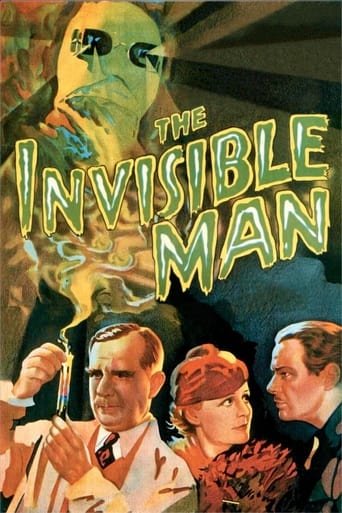

The Invisible ManInvisibility is the best superhero power because you don't have to wear a spandex costume.Regrettably, the unseen man in this horror-fantasy leans more to supervillain-y. Swathed in bandages, a cloaked traveler, Griffin (Claude Rains), checks into a remote English inn to conduct chemistry experiments undisturbed. When the belligerent border's antics begin to disrupt the pub below, the innkeeper calls the coppers to evict their volatile visitor. But the Bobbies are unable to dislodge the lodger because they cannot see him.Naked as a jaybird, and mad as a hatter, Griffin embarks on a killing spree.Based on H.G. Wells' groundbreaking novel, Frankenstein director James Whale undertakes the intangible challenge of bringing this imperceptible madman to life and - despite the annoying innkeeper's wife - executes a masterful cinematic achievement in both visual and sound effects. Moreover, the invisible man is easy to locate once the wolf man has his scent. Green Lightvidiotreviews.blogspot.ca
... View MoreI had not noticed before how reminiscent the opening music to 'The Invisible Man' is to the repeatedly used scores from the 1940's Universal monster films.The tavern into which the heavily dressed be-hatted figure of Griffin enters, ushering with him billows of snow, could be tailor-made for the cliché legend 'We don't like strangers about these parts.' Indeed, there are few stranger than Griffin: monosyllabic, wrapped in overcoat, bandages, gloves and hat. And yet the sinewy collection of cadaverous locals huddled up for warmth in 'The Lion's Head' seem more eccentric yet. Una O'Connor, who would tone down her performance not one iota for Minnie in 1935's 'The Bride of Frankenstein' plays landlady Jenny Hall as a shrieking willowy old cockney. When EE Clive is introduced as the village 'bobby', with a 'here, wot's all this?' the conglomerate of grotesques is complete – suddenly, Griffin seems almost straight-laced by comparison.Onto this tapestry, the mysterious newcomer reveals the secret of the mystery that appears to surround him. "You're crazy to know who I am, aren't you?" he growls as, with a merciless onslaught of John P Fulton's magnificent special effects, his secret is revealed. "He's invisible, that's what's the matter with 'im," concludes Constable Jaffers.After this truly peerless first act, the rest of the film doesn't quite match up. How could it? It is, nevertheless, hugely entertaining throughout as second-billed Gloria Stuart is introduced as fiancée Flora Cranleigh and William Harrigan as the unfortunate Kemp.And yet it is Claude Rains, mostly unseen, who retains the acting honours as a character who traverses suspicion, hilarity, madness and ultimately tragedy in the title role. From his first appearance trudging through show that clings like porridge (perhaps that is what it was – whatever, the snowbound scenes are incredibly convincing) to his maudlin final act, he deserves every word of the praise heaped upon him. As does Director James Whale and effects man Fulton (and his team), both very much at the top of their game.There would be recasts for subsequent sequels featuring invisible relatives, but as with every other Universal horror franchise (excluding possibly 'Frankenstein', which to my mind was trumped by its first sequel) this remains a classic unsurpassed.
... View MoreTIM is closely related to another story by H.G.Wells, namely "The Man who could work Miracles". To these two may be added "The Time Machine". Although I've read the original books I've forgotten what they were like, but have recently seen all three films. It seems to me Wells was concerned with the nature of power, and how it was to be used. Was it possible to harness power for constructive ends ? Or did power corrupt, and absolute power corrupt absolutely ? Moreover, what would motivate man if the laws of demand and supply were abolished, and all his wants were easily met ? If invisibility, or miracle-working, gave him infinite power, what would he do with it ? These fables suggest he'd go barmy. By the mid 1930s Hitler, a National Socialist, developed spectacular power, and by the 1940s he'd gone barmy: the books were prophetic. TIM was first published in 1897; the film came out in 1933. TMWCWM was published 1898, and the film was made in 1936. Wells was a Socialist, and I believe he was seriously bothered by the realisation that it wasn't love that made the world go round, but man's constantly unsatisfied and insatiable demands. So what would happen if everyone's needs were immediately met ? We are offered a picture of what happens when one man's limitless power leaves him with no natural needs.It is difficult to make out if this is meant to be a rambunctious farce, or a deeply significant fable with a serious moral lesson for us all. The local yokels are the dimmest imaginable, and PC Plod is a classic of his kind. There are others, who voice some of the most idiotic remarks that could be dreamt up. Una O'Connor, as almost everyone agrees, is an irritant beyond belief. The film is a hybrid, a comic tragedy, with several murders, all of no importance. It makes you think, though, and despite their age the effects are dateless. But how come the man's hair isn't invisible when his hat's off in the early scene in the inn ? Or was he wearing a temporary wig ?
... View MoreThe man whose head was wrapped in bandages almost always acts disturbing. If such a phenomenon following the horror elements, the story will seem daunting. THE INVISIBLE MAN is a pretty good horror. Films with visual and digital effects that should arouse a certain horror and shock in their thirties may have accounted for an incredible miracle, and he would have shocked all those who love the wonders of film creation or animation. The director who is brave enough to snatch shots and camera in order to shock the masses deserves slope to the floor. Claude Rains played the role of the phantom man only voice and gestures to him throughout the film does not see the face. The viewer will now feel plasticity, especially in the action scenes where you can see all the effort to do everything as perfectly. It was a time when the science-fiction genre fits exactly with the avant-Gard, expressionist or any other modernist expression. I think it was in the thirties simply thought the film magic on the one hand and garbage that draw the attention of viewers with themes and stories from the other side. James Whale is a story worked out in great detail. In the sci-fi genre that's necessary. The film observes a strange accelerated progression, the movements of the characters and developments, observed something sudden energy in dialogue. Mystique! Invisible man stew to the city and the people as a man in introversion with the capacity of invisibility, but as a man who is 'happy' under the influence of specific chemicals. Scientist! His motives are from some strange inner subconscious urge and desire to experiment, poured into an invisible form in which he wakes up madness and revenge hunger for power. Invisible Man becomes no longer a criminal in order to crime, rather than becoming a terrorist who with pleasure wants to destroy the world.The atmosphere is grim. The story was only solid. The film is a horror, but he lacks a bit of weirdness. I have the impression that the key scenes is not going to end. Invisible man is not enough. The film is less dosed with black humor.The main actor Claude Rains was forced to use a particular outfit and make-up, a recording was extremely hard and uncomfortable. I think he has put a lot of effort and did a good job.Other actors are solid, and in particular to highlight Una O'Connor, her "interesting" face and tragicomic screaming.James Whale was once again confirmed the reputation of a specialist in horror films. In the end he managed to convince the audience that the main protagonist is invisible.
... View More